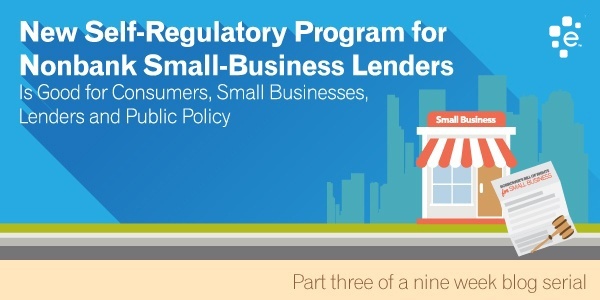
The Responsible Business Lending Coalition — a group of nonbank small-business lenders — announced a self-regulatory program during August that is designed to bring greater clarity and consistency to its industry’s pricing and consumer protections. The Small Business Borrower’s Bill of Rights outlines six primary principles that those signing the pledge will abide by when lending to small businesses. They include:
- The right to transparent pricing and terms, including a right to see an annualized interest rate and all fees
- The right to non-abusive products, so that borrowers don’t get trapped in a vicious cycle of expensive reborrowing
- The right to responsible underwriting, so that borrowers are not placed in loans they are unable to repay
- The right to fair treatment from brokers, so that borrowers are not steered into the most expensive loans
- The right to inclusive credit access, without discrimination
- The right to fair collection practices, to prevent harassment and unfair treatment
“Online loans with shorter terms, and high-priced loans have a higher degree of creating debt traps,” explained Conor French, director of legal & regulatory for Funding Circle, one of the coalition’s founding members. “Borrowers in the online market need to be able to make an apples-to-apples comparison between lenders and between loans. We wanted to create a choice architecture that allows borrowers to see similar information.”
Adoption of Industry Best Practices Helps Establish Clear Rules of the Road
The adoption of self-regulatory standards by this group of small-business lenders is an important step in proactively addressing some of the concerns that policymakers may have about this emergingmarket. It also is vital to helping provide transparency and assurance to small-business owners that rely on affordable access to capital to start and operate a business.
Non-bank small business lenders often fall outside some of the regulatory framework that regulated entities must meet. However, as new innovative underwriting solutions will sometimes incorporate the consumer credit history of the business owner or entrepreneur, the line between consumer and business regulation can get blurred.
The self-regulatory pledge incorporates many of the themes that have been part of the Consumer Financial Protection Bureau’s push for transparency across the consumer financial marketplace, including the short-term lending market.
 “Online loans with shorter terms, and high-priced loans have a higher degree of creating debt traps.”
“Online loans with shorter terms, and high-priced loans have a higher degree of creating debt traps.”
Conor French
Director of Legal & Regulatory
Funding Circle
“Abuses can come from lenders, brokers or other unsavory players,” French noted. “For example, if you’re using a broker or partner, are there conflicts of interest? Are they arranging the deal that’s best for you or best for them? Only by having open transparency can you understand what your options truly are. You can’t just accept what someone else chooses for you at face value.”
Self-Regulation Shows Self-Discipline and Addresses Evolving Public Policy Priorities
Industry self-regulatory standards, such as the Borrower’s Bill of Rights, can be a good way for market leaders to demonstrate self-discipline by responding to the evolving public policy priorities of legislators and regulators. Industry self-regulation can be preferable to legislative or regulatory changes in some cases because it is flexible and can accommodate evolving market trends and consumer expectations.
This is especially true when considering markets where innovative, disruptive technology and products are being developed, such as that of small business lending and peer-to-peer markets. The fact is that the development of regulations takes considerable time. Self-regulation can change more quickly as technology and markets evolve and mature. Industry self-regulation can help to provide transparency and protect consumers without impeding innovation.
“Ultimately, I think government regulation of this market is inevitable,” French conceded. “But, we don’t know when it will happen, who will write the standards or who will manage enforcement. We believe by encouraging responsible self-regulation, we’re not only forestalling federal involvement, but also creating a model for what the government should do should it step in.”
Gaining Critical Mass and Ensuring Accountability
There are challenges when it comes to ensuring the effectiveness of a robust industry self-regulation regime. First, it can be difficult to have entities outside of the industry leaders to adopt and abide by the best practices. For small and medium-sized entities, the development of self-regulation may seem like a barrier to growth. Demonstrating the need and value of industry self-regulation to all market participants, regardless of size or market share, is essential.
Another key hurdle is that any industry self-regulation must be accompanied by clear and well-respected accountability measures. Self-regulatory pledges are only as good as the accountability measures that ensure compliance. Without being held responsible for meeting industry best practices, regulators are unlikely to take the self-regulation seriously and may be more willing to cite the need for new regulation to address a market failure. However, accountability measures that have real teeth and oversight from a third party, such as a trade association, help to ensure that the industry takes the matter seriously and additional action from regulators is unnecessary.
“Our Small Business Borrower’s Bill of Rights is currently being enforced by the Small Business Majority, a nationally recognized nonprofit organization,” French stated. “Having third-party endorsement helps avoid any conflicts of interest. As for actual penalties, we believe that reputational risk is quite significant.”
Experian has experience implementing industry best practices
Experian has considerable experience with the adoption of industry best practices across all of our businesses. Most notably, we worked closely with our competitors and clients to develop and implement enforceable self-regulation for the digital marketing industry. The Digital Advertising Alliance’s (DAA) self-regulatory regime has allowed for innovation and growth to continue, while at the same time enhancing transparency and consumer protection. Since its inception, there have been more than 50 million unique visitors to the DAA program websites, where consumers have been able to not only exercise their choice to opt-out of digital advertising, but also receive detailed education about the program.
Experian looks forward to working with clients in the online marketplace lending segment as they implement the Borrower’s Bill of Rights in an effort to improve transparency and understanding of this market.
Related articles
Just how alternative are today’s online marketplace lenders?
How online marketplace lenders are changing the rules of small-business finance
Self-Regulatory Program for Nonbank Small Business Lenders
Top regulatory priorities for commercial lenders
Playing to Your Strength – Opportunities for Regional Banks to Build Better Lending Portfolios
Game Changer – How Marketplace Platforms Are Bringing Financial Institutions Back to Small-Business Lending
Marketplace Matchmakers – How Loan Aggregators Bring Borrowers and Lenders Together
New Frontiers – What’s Next For Marketplace Lending?
